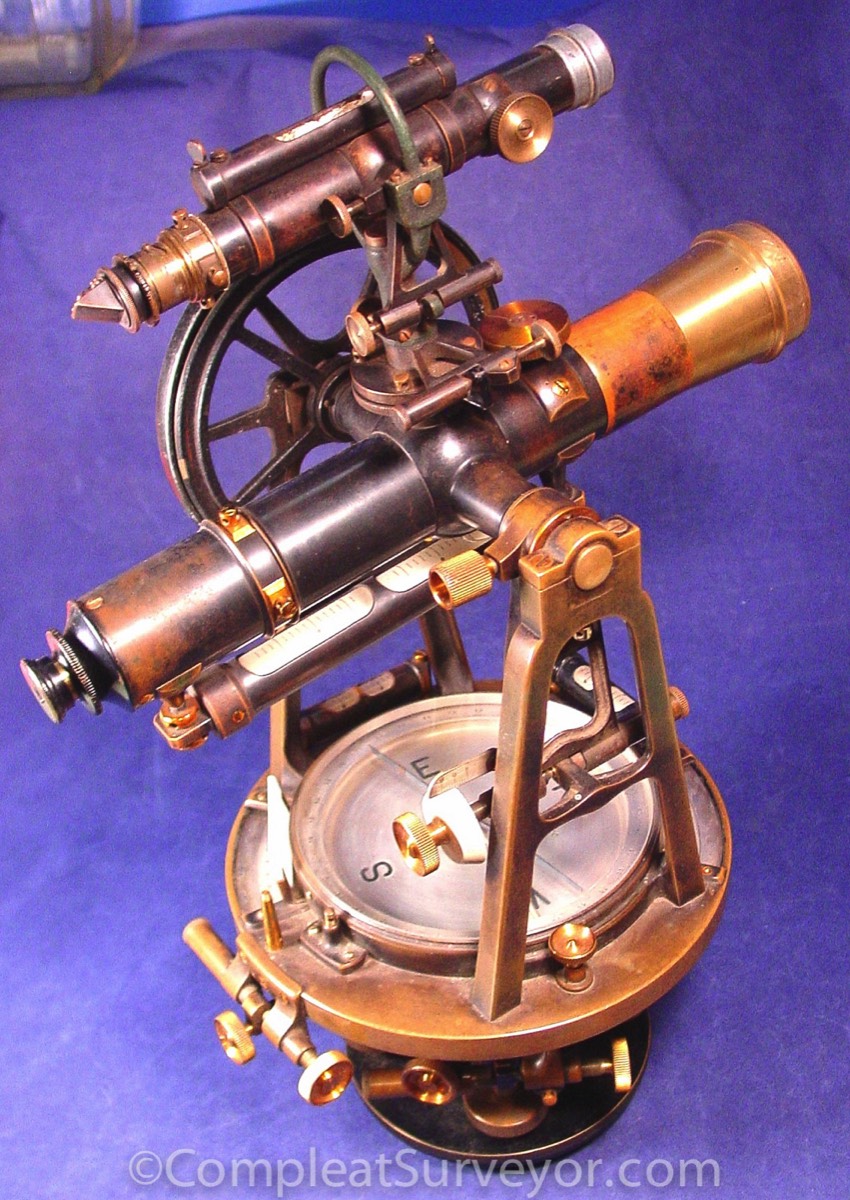
Eugene Dietzgen
History
Eugene Dietzgen Co.
1885-2002
Eugene Dietzgen was born in Uckerrath, Germany on May 6, 1862, he died in Chicago on December 1, 1929. Eugene was the eldest son of Joseph Dietzgen, a German tanner-turned-Communist who read Marx and joined the Revolution of 1848, which got him exiled from Germany. At age two Eugene was taken by his father to Tsarist Russia, where he was educated in the Russian language and in his father's trade, tannery. They both returned to Germany in 1868.
In 1881, Eugene's father sent him to America to escape the Kaiser's military draft and to hide some of his father's socialist literature; the literature had already landed Joseph in jail a few years before. Eugene was only 19 years old when he arrived in New York City. He began work with a German drafting company, and eventually moved to Chicago.
In Chicago Dietzgen started the Eugene Dietzgen Drafting Company, the company was founded on November 13, 1885 under the name of Luhring & Dietzgen. This partnership was succeeded by Eugene Deitzgen & Co. in 1891. Successor corporation under the name of Eugene Dietzgen Co. of Illinois occurred on February 3, 1893 and the present corporate company, Eugene Dietzgen Co. of Delaware was incorporated in Delaware on October 29, 1917. By 1906, Dietzgen had two manufacturing plants.
The company was noted for its production of slide rules, which Dietzgen started in 1898 after acquiring a patent from John Givan Davis Mack (1867–1924). His company's Mack Improved Mannheim Simplex Slide Rule sold from 1902 to 1912 for $4.50.
Dietzgen was heavily influenced by his father, one of Karl Marx's favorite philosophers. He provided his factory workers with many amenities not often found in the 19th century. These included separate bathrooms for men and women, open windowsills with flowers decorating the air, and a general atmosphere of a healthy working community. Dietzgen 's first wife could not bear him children; they divorced, and in 1912 Eugene moved to Zurich, Switzerland. There he met his second wife, Jansen, and they had three boys and three girls.
The company still exists, and its second building remains as a part of DePaul University, at the corner of Fullerton Avenue and Sheffield, in Chicago's once heavily German neighborhood of Lincoln Park. The original building still stands at 218 East 23rd Street, Chicago, operates today as Dietzgen Corporation, a privately held company.
Chronology of the Dietzgen company.
1885 – German immigrant Eugene Dietzgen founds his own engineering supply house as both a dealership and manufacturers’ representative in Chicago, Illinois.
1893 – First manufacturing facility opened producing T-squares, drawing boards,
surveying instruments and other engineering supplies that are now highly valued by collectors for their craftsmanship and quality.
1906 – Second manufacturing facility opened at Fullerton and Sheffield Sts. In Chicago.
This plant was continually expanded until sold in 1976. It is now a historical landmark.
1920 – Dietzgen becomes the exclusive U.S. marketer of German dry “diazo”
positive-reproduction white printer papers.
1959 – Dietzgen becomes first company to market commercially viable polyester drafting films.
1974-1976 – Regional coating plants are combined with distribution centers to better service primary marketing regions at competitive cost.
1986 – Large document copier media – Dietzgen’s first digital printing products – is introduced.
1995–In its 110th anniversary year, Dietzgen announced the acquisition of the
Klingler company. The newly consolidated corporation enhances both firms' contributions to the marketplace by providing new technologies, new products and new services
to the reprographics industry.
2002 – Nashua Corporation purchases Dietzgen assets and integrates them with its own growing digital imaging business. Retaining the Dietzgen name, this new division brings a new customer focus and paper converting expertise to the business.
2004 – Nashua acquires the Magellan line of media to position Dietzgen as a full-service
provider to the growing large-format graphics market.
2005-2006 – Dietzgen opens new facilities in Jefferson City, TN and Cranberry, NJ, while upgrading its current plant in Los Angeles, CA, to provide better service to a customer base that has grown to more than 1,500 dealers and service bureaus.
Joseph Dietzgen – Eugene’s father
Joseph Dietzgen was German tanner-turned-Communist who read Marx and joined the Revolution of 1848, which got him exiled from Germany. He relocated to Tsarist Russia, where he was educated in the Russian language and in his father's trade, tannery. They both returned in 1868.
So he moved to the U.S. and traveled the antebellum south, writing about slavery and lynching. He returned to Europe, building tanneries for the Czar, writing philosophy, and corresponding with Karl Marx, who called him “the philosopher of socialism”; Joseph Dietzgen is credited with coining the phrase “dialectical materialism” in 1887, though the idea itself was sort of floating around in the socialist ether of the times:
The “diamat” was a social theory coined by 19th century philosopher Joseph Dietzgen which emphasized commodities and the effects of their exchange over time. Dietzgen used his theory sparingly to explain the nature of socialism and social development, but it was never researched academically until the Soviet Union indoctrinated the philosophy.
Joseph returned to Germany and shortly thereafter dispatched his son Eugene to the States to avoid the draft. Eugene arrived in Chicago from New York in the early 1880s, and started his company here. Joseph followed in 1886… just in time for the Haymarket Bombing. In its wake, two employees of the radical German-language newspaper Chicagoer Arbeiterzeitung—typesetter Adolph Fischer and editor August Spies—were tried and executed for the bombing. Joseph Dietzgen temporarily filled Spies’s position as editor of Arbeiterzeitung. He died two years later.
At home enjoying a cigar after a stroll in Lincoln Park, he was engaged in a “vivacious and excited” discussion of the “imminent collapse of capitalist production” when he suddenly stopped in mid-sentence, his hand uplifted—dead of “paralysis of the heart.” Joseph Dietzgen was buried in the German Waldheim Cemetary in Forest Park, alongside Spies, Fischer, and the other Haymarket Martyrs.
Catalogues
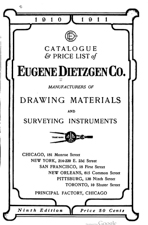
Dietzgen - A well known company starting in roughly 1900 to the mid1900s:
Labels
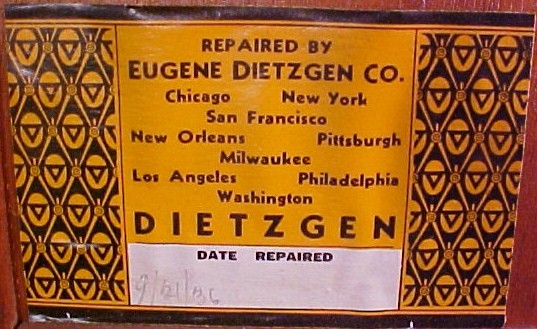
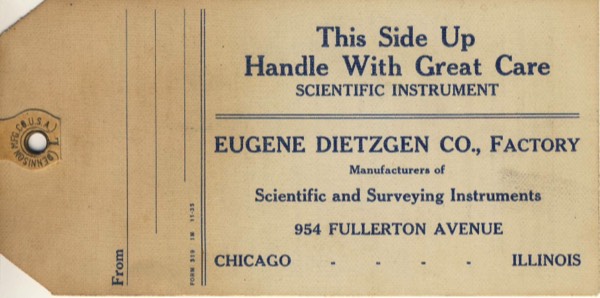
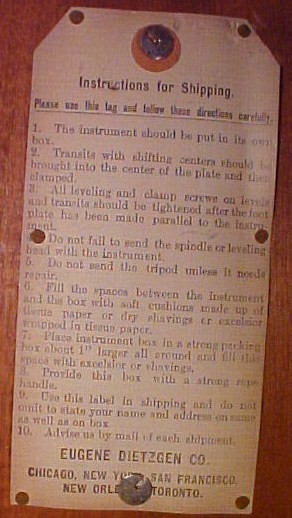
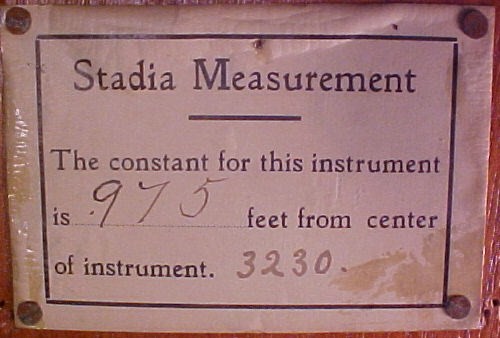
© 2020 Russ Uzes/Contact Me